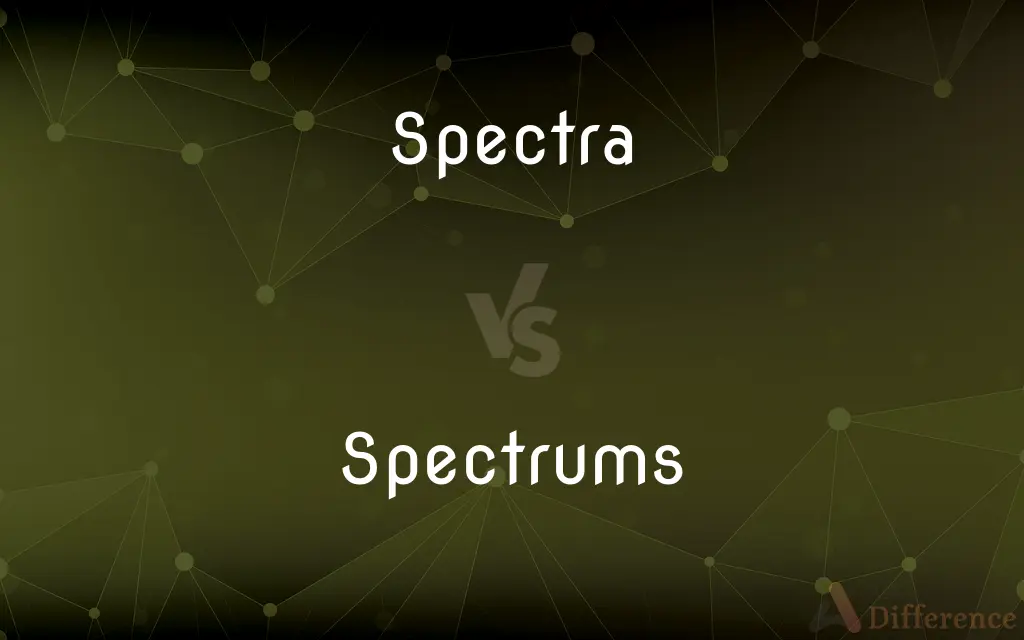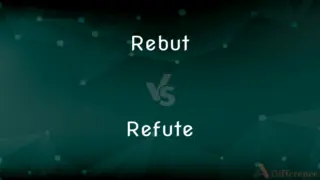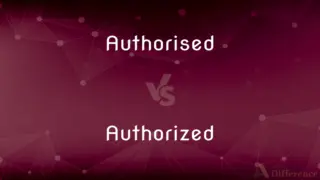Spectra vs. Spectrums — What's the Difference?
Edited by Tayyaba Rehman — By Fiza Rafique — Updated on March 28, 2024
Spectra refer to the plural of spectrum in scientific contexts, highlighting ranges of conditions or values. Spectrums, while also a plural form, is often used in more general or non-scientific discussions.

Difference Between Spectra and Spectrums
Table of Contents
ADVERTISEMENT
Key Differences
Spectra is traditionally used in scientific contexts to describe arrays of elements, such as light or sound waves, categorized by wavelength or frequency, whereas spectrums can be found in both scientific and everyday language, reflecting a broader range of meanings including ranges of ideas or conditions.
Spectra often implies a precision and categorization according to specific physical properties, like electromagnetic spectra dividing light into colors based on wavelength, on the other hand, spectrums may refer to more generalized ranges, such as the autism spectrum, which classifies a range of neurodevelopmental conditions.
In technical documentation or academic papers, spectra is preferred to maintain consistency with scientific norms, while spectrums is more commonly used in informal writing or discussions, illustrating its versatility in language usage.
The usage of spectra suggests a certain level of expertise or familiarity with the subject matter being discussed, especially in physics or chemistry, whereas spectrums is more accessible, used by a wider audience without necessarily implying specialized knowledge.
While spectra is rooted in Latin, preserving the classical pluralization of "spectrum," spectrums adopts the more modern English convention of adding "s" or "es" for plurals, reflecting the evolving nature of language and its adaptations to contemporary usage.
ADVERTISEMENT
Comparison Chart
Usage Context
Scientific, particularly in physics and chemistry.
General and non-scientific discussions.
Implication
Precision and categorization by physical properties.
Broad ranges of ideas or conditions.
Preferred in
Technical documentation, academic papers.
Informal writing, everyday language.
Knowledge Level
Implies expertise or familiarity with scientific terms.
Accessible to a wider audience.
Linguistic Origin
Latin pluralization of "spectrum."
Modern English adaptation of forming plurals.
Compare with Definitions
Spectra
Array of Light.
The prism broke the light into a beautiful array of spectra.
Spectrums
Non-Scientific Contexts.
The report explores the spectrums of human emotion.
Spectra
Electromagnetic Spectrum.
Ultraviolet lies between visible and X-ray regions in the electromagnetic spectra.
Spectrums
General Range.
Their political beliefs cover a wide spectrums of opinions.
Spectra
Wave Frequencies.
The equipment can detect a wide range of sound spectra.
Spectrums
Broad Overview.
The document provides spectrums of the project's impact.
Spectra
Range in Physics.
Scientists analyzed the star's light to study its spectra.
Spectrums
Diversity.
The festival celebrated cultural spectrums from around the world.
Spectra
Chemical Signature.
The gas’s spectra revealed its composition.
Spectrums
Inclusive Terminology.
The discussion included spectrums of gender identities.
Spectra
A plural of spectrum.
Spectrums
The entire range over which some measurable property of a physical system or phenomenon can vary, such as the frequency of sound, the wavelength of electromagnetic radiation, or the mass of specific kinds of particles.
Spectra
Plural of spectrum
Spectrums
A specific portion of such a range
The infrared spectrum.
Spectrums
A characteristic distribution of phenomena manifested over such a range
The emission spectrum for sodium vapor.
Spectrums
A graphic representation of such a distribution; a spectrogram.
Spectrums
A band of colors produced when the wavelengths making up white light are separated, as when light passes through a prism or strikes drops of water.
Spectrums
A range of radio frequencies assigned by a regulatory agency for use by a given group or organization.
Spectrums
A range of values of a quantity or set of related quantities
The income spectrum.
Spectrums
A sequence or range of related qualities, ideas, activities, entities, or phenomena
The whole spectrum of 20th-century thought.
The spectrum of genes involved in the immune response.
Spectrums
Plural of spectrum
Common Curiosities
What are spectra?
Spectra are arrays or ranges of elements, such as light or sound, categorized by wavelength or frequency, often used in scientific contexts.
Why is the term spectra used in science?
It adheres to the traditional Latin pluralization and is precise for categorizing phenomena like light waves.
Can spectra and spectrums be used interchangeably?
While they can sometimes be used interchangeably, spectra is more specific to scientific contexts, and spectrums to general usage.
How has the usage of spectra evolved over time?
Its usage has remained relatively stable, primarily in scientific fields to describe categorized ranges.
What are spectrums?
Spectrums refer to ranges or series, often used in broader, non-scientific contexts to describe a variety of conditions or ideas.
Is it correct to use spectrums when talking about light?
It's more accurate to use spectra in scientific contexts concerning light, but spectrums might be used in more general discussions.
How do educational materials treat spectra and spectrums?
Educational materials typically use spectra for scientific concepts and may use spectrums for broader, less technical explanations.
Are there specific fields where spectrums is more appropriate than spectra?
In fields outside of the physical sciences, such as social sciences or general discussions, spectrums might be more appropriate.
How do spectra differ from spectrums in usage?
Spectra is preferred in scientific discussions for precision, while spectrums is used more generally.
What does the electromagnetic spectra include?
It includes all types of electromagnetic radiation, from radio waves to gamma rays.
Can the term spectrums apply to social sciences?
Yes, it's often used to discuss a range of behaviors, beliefs, or conditions in social science contexts.
What linguistic origin does spectra have?
Spectra comes from Latin, where "spectrum" means "image" or "apparition," and its plural form is maintained in scientific English.
How do dictionaries define spectra and spectrums?
Dictionaries define spectra as the plural form of spectrum in scientific contexts, while spectrums is recognized as a general plural form.
Do all scientists prefer spectra over spectrums?
Most scientists prefer spectra when referring to categorized scientific phenomena, though usage can vary by individual.
What impact does audience understanding have on the choice between spectra and spectrums?
The choice often depends on the audience's familiarity with the subject; spectra for specialized audiences and spectrums for general understanding.
Share Your Discovery

Previous Comparison
Rebut vs. Refute
Next Comparison
Authorised vs. AuthorizedAuthor Spotlight
Written by
Fiza RafiqueFiza Rafique is a skilled content writer at AskDifference.com, where she meticulously refines and enhances written pieces. Drawing from her vast editorial expertise, Fiza ensures clarity, accuracy, and precision in every article. Passionate about language, she continually seeks to elevate the quality of content for readers worldwide.
Edited by
Tayyaba RehmanTayyaba Rehman is a distinguished writer, currently serving as a primary contributor to askdifference.com. As a researcher in semantics and etymology, Tayyaba's passion for the complexity of languages and their distinctions has found a perfect home on the platform. Tayyaba delves into the intricacies of language, distinguishing between commonly confused words and phrases, thereby providing clarity for readers worldwide.















































